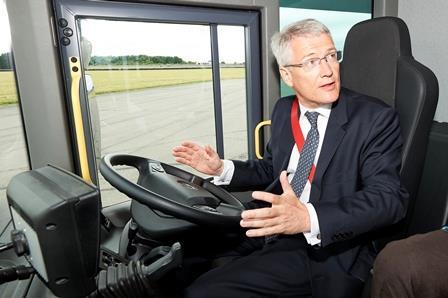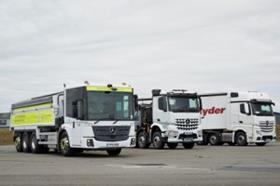
Road freight transport is the “lifeblood running through the veins of the British economy,” roads and freight minister Andrew Jones MP told MT this week.
Jones was at the HORIBA-MIRA proving ground at the invitation of Motor Transport publisher Road Transport Media and Mercedes-Benz to get his first taste of driving HGVs.

The minister tried his hand in an 8x4 Econic low cab tipper, a conventional Arocs 8x4 tipper and a top of the range 630hp 6x2 Actros tractor unit with a GigaSpace cab, describing the experience as “immensely valuable”.
Jones told MT that his two key priorities were improving air quality and road safety, but there had to be a recognition that freight was the “bread and butter” of the economy and his challenge was also to highlight the importance of the industry and encourage more people to join it.
“We can improve air quality and safety without bringing the country to a halt,” he said. “It is clear that the industry is trying hard on cycle safety. We need technology like the safer urban truck and more education of both HGV drivers and cyclists of the dangers of HGVs in cities.”
After driving the Econic and Aroc, Jones said the low entry, high visibility cab was “a totally different experience” to the conventional cab-over Arocs. “They are both easy to drive but the visibility is transformed,” he said. “The Econic driver is surrounded by glass and is significantly lower than in the other vehicle.”
Mercedes-Benz UK sales engineering manager Nick Blake said that the Econic was only available with a maximum engine rating of 330hp but this was more than adequate for delivering to construction sites. And while the ground clearance was reduced compared with the Arocs this could be overcome by proper design of building sites. “In urban delivery applications it is an outstanding truck,” he said.

Asked what changes in transport policy the Conservative government was introducing following their election victory and the end of the Coalition, Jones said the priority was to “drive the economy forward” and the recent Budget changes to VED and its hypothecation (linking) to roads spending were “significant changes” that would boost growth.
“There had been no steady long term approach to highways,” he said. “Now we have a roads investment scheme to deliver a huge upgrade in infrastructure that will be a long term driver of growth. The hypothecation of VED is all about delivering it.” The government plans to invest £15bn in the UK road network by 2021.
Jones said the UK national government was ultimately responsible for improving air quality, though local administrations such as the Mayor of London had a role to play too.
“We have a national air quality issue,” Jones said. “We are on the wrong side of a Supreme Court judgement and there is a cross-government initiative working up a response to that.

"In transport we are responsible for the emissions levels of vehicles and we are working with European partners to make sure we deliver on that. We can improve the quality of the environment in our urban areas particularly by encouraging cleaner, greener types of transport. I am extremely keen to see our national fleet evolve to take the opportunities of engine enhancement so that we improve air quality.”
Jones said that while progress was being made on CO2 emissions, local pollutants like nitrous oxides still had to be dealt with. He said Euro-6 diesel-engined trucks were “part of the answer” to the problem of NOx emissions. “There is no question in my mind about that," Jones said.













